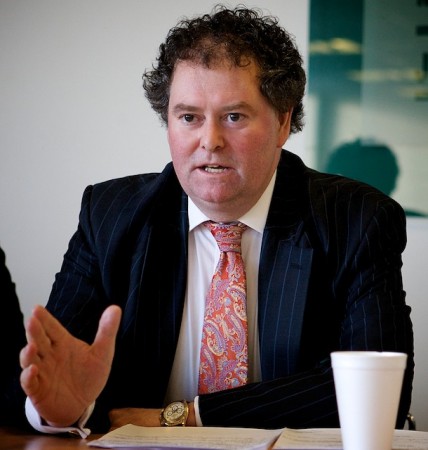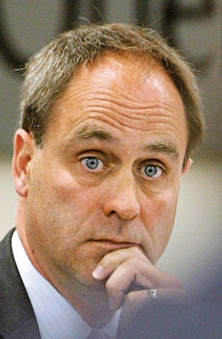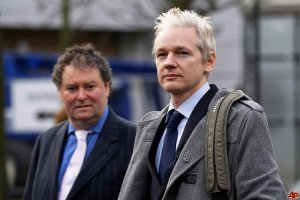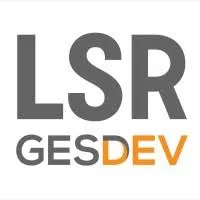L'avocat d'Assange à Montréal, de quoi a-t-il parlé?

L'équipe Droit-Inc
2011-05-18 10:15:00

André Ryan : Bonjour. Mon nom est André Ryan. Je suis associé senior chez BCF, un bureau d’avocats de Montréal. Donc BCF et Meritas vous remercient d’être venus aujourd’hui nous rencontrer. On est réunis ici à Montréal dan sle cadre de la 21e conférence annuelle de Méritas. Méritas est un regroupement de cabinets d’avocats d’affaires qui compte plus de 7 000 avocats dans 73 pays et plus de 250 villes réparties sur les cinq continents. Près de 400 de ces avocats-là sont réunis à Montréal pour discuter d’affaires et de références et de toutes sortes de questions relatives à l’évolution de notre milieu.
Parmi nos distingués invités à la conférence de Montréal, mon ami, Me Mark Stephens, de l’étude Finers Stephens Innocent que j’appellerai FSI, FSI est membre de Méritas depuis 2002 et Mark est un membre très actif dans le réseau. Il participe à peu près à tous les forums que nous avons, incluant bien sûr le meeting annuel, la réunion européenne et Mark se déplace régulièrement en Amérique du Nord pour les meetings régionaux d’Amérique du Nord. Mark est impliqué depuis quelques mois comme vous le savez dans un dossier judiciaire qui est, selon moi, j’ai pas fait de calculs scientifiques, mais probablement le dossier judiciaire le plus médiatisé de l’histoire contemporaine. Il représente comme vous le savez, monsieur Julian Assange, co-fondateur de Wikileaks. Il – Mark conseille également Wikileaks dans la conduite de ses affaires.
Ce n’est qu’un des dossiers très médiatisés dont Mark s’occupe. Il a le privilège depuis plus de 25 ans de s’occuper de nombreux dossiers extrêmement, je vous dirais, passez-moi un anglicisme, high-profile et Mark est également un commentateur régulier de l’actualité judiciaire et de l’actualité du monde juridique en général à Londres et sur la scène internationale. Il a le privilège de représenter parmi les clients une variété impressionnante de clients, des pays, je pense notamment la République de Russie, à Chypre, à l’Île Maurice et dans les cas où il travaille avec ces pays-là, souvent il est appelé à conseiller ces pays-là dans la rédaction des lois internationales qui visent à favoriser l’émergence et l’expansion d’une véritable libre expression et de la liberté de presse et des médias.

I’m going to switch to English for a second. Mark has kindly accepted to speak to you about his work with Mr. Assange and to share with you his perspectives on how it has challenged and is still challenging the world of media, the accountability of governments and generally speaking, the democratic world. Before we do that and before I let Mark make his initial presentation, I’m going to take two seconds to talk about process. Mark apologizes, he wishes he could speak to you in French, but his French is not good enough, so he is going to speak to you in English.
Alors Mark ne peut pas malheureusement, il s’en excuse, vous parler en français, faire son point de presse en français. Il va vous faire une présentation initiale en anglais et il sera disponible pour répondre à vos questions par la suite. Si vous en êtes capable, on vous demanderait évidemment pour les questions de vous avancer au micro, si vous en êtes capable, posez la question en anglais. Si vous préférez poser la question en français, je m’efforcerai d’agir comme agent traducteur et on trouvera un moyen d’obtenir la réponse de Mark. Je vous demanderais quand vous avancez au micro de vous identifier dans un premier temps et d’identifier le micro pour – le média, pardon, pour lequel vous travaillez.
Mark aura également, je pense, et je terminerai là-dessus, si vous le souhaitez, l’occasion de parler d’un dossier qui vient tout juste de faire l’objet d’une décision en Europe, a very recent and still hot judgment. Mark représentait des médias dans un dossier très médiatisé et qui est relatif à l’affaire Max Mosley (ph.) qui est l’ancien président de la Fédération internationale automobile et ça lui fera plaisir de vous parler du jugement qui a été rendu. When was the judgement rendered? Earlier this...
Mark Stephens : Tuesday.
André Ryan : Tuesday. So without further saying, I’m very happy to introduce my good friend, Mark Stephens.
Mark Stephens : Well, thank you all very much for coming. We all I think believe that, and each one of us enters into a covenant with the state, that we allow them to have secrets so that they can better rule us and rule us in our best interests. Of course, that is a covenant which has to be policed and it is policed by the fourth estate, by the media and it is one that, by the policing of the media, enables us as the citizens to be sure that the politicians are kept honest, that the corporations are kept honest in the way in which they behave on our behalf when they are exercising those secrets and it is to that end that Wikileaks made available to CBC shortly before, two weeks before the Canadian election recently a throve of cables relating to – cables from and relating to Canada so that the Canadian populus, the Canadian electorate would be better informed about matters on which they were going to exercise their democratic mandate.
I would like to now move to something slightly different which is about the impact of the change which I think Wikileaks has rolled. You are all experienced journalists. You will know that no longer is it common for a source to come along to you with a couple of dogged photocopies, but rather, these days, the journalists receive CDs full of material which means that we have to develop, when acting with journalists and I do that much – for much of my work, ways in which that material needs to be interrogated. That means that the skills of the journalists are changing. They have to be able to mash up the data, because there is so much there, they need to be able to interrogate the data and it makes it a much more difficult and somewhat more expensive process to enable people to analyze that, but for years, we have had a situation where newspapers and broadcasters around the world have had the anonymous drop box where you can take a brown envelope, as a whistle-blower, and deliver anonymous information of great public importance.

Now we have had a real challenge, particularly for the media in recent years with this exponential increase in the number of documents which are classified and the amounts of information which is classified. Now we all accept that there needs to be some secrets for a limited amount of time. The problem that we are facing in the modern era is that we have a much larger raft of information being classified for a considerably longer period of time. As an example, I will give you that on the 14th of April this year, the American government decided that they would not release the official history of the Bay of Pigs invasion which happened 50 years ago, in 1961.
Now many people in this room weren’t even born when that occurred and anyone who was 20 years old when they partook in that invasion, that failed invasion, would now be 70 and it does seem to me that any possible secret or reason for secrecy as opposed to perhaps public embarrassment has gone and I think that this point was made very clearly to me by Sir Richard Dearlove. Now Sir Richard Dearlove is better known to followers of the security services as the head of MI6, as C, played in James Bond films by Judy Dench usually, but there is a real Sir Richard Dearlove and he is the real life C, or was the real life C, he now is a master of Oxford and he said, “Of course, countries need secrets, but not as many you would think” and I would think that he is absolutely right about that and one of the problems that we have is that we need to understand what information can be released.
Now if we take for example the recent throve of Wikileaks releases, the 250,000 documents, that information obviously contained some sensitive details as opposed to embarrassing details and I think what people are unaware of, partly because the American have not confessed to it, but before publication, Julian Assange got in touch with the Americans and offered them the opportunity to indicate if there was any document which needed to be redacted, to protect public health or indeed the health or well-being of any person that was conducting some operation or any other form of covert activities. In fact, they didn’t come back and ask for anything to me redacted beyond a few simple things and there was ongoing cooperation also with the more traditional forms of media.
The only area that there was - that there was a dispute, where the Americans asked for information not to be published was in relation to Americans bombing Yemen on behalf of the Yemeni government, bombing their own populace. Now I think that it was considered very carefully and the Americans were concerned that a war might break out if it became known that they were having yet another adventure in the Middle East and it was decided that because it was of such public importance to be aware that the Americans were up to another adventure in the Middle East, that they should be held accountable, and luckily, we know that there has been no problem, although it has led to perhaps some change in government pending in that particular country.
I’m going to close shortly, but I would just say I would like to also get some perspective into this. I’m very often asked, you know, well it has obviously been going, there has been a lot of information put out into the public domain, information from the fact that actually China is prepared to allow North Korea to be taken back by the South Koreans, that the Americans were spying on the UN despite having given a solemn covenant not to do so, particularly when UN was set up, it was set up in New York so that it would be protected by the U.S. against rogue nations who knew that America was indeed one of those rogue nations, spying on this organization which the world says it should not, but at the moment, only 8.2% of the entirety of the throve of material has been released.
So there is an incredible amount out there that hasn’t been released and even in relation to material which hasn’t yet been processed and released, the material has come out, there is a lot that hasn’t been analyzed. So for example, a lot of the economic data, the economic espionage which the Americans have indulged in, that information hasn’t been analyzed or looked at with any scrutiny and they obviously are going to need an organization like Bloomberg or the Financial Times or one of the major global players in economic reporting to be able to do that.
With that, I would say that I’m happy to answer any questions that you may have and if you could ask through André, I would be happy.
André Ryan : Et je sais pas, s’il y a un besoin, peut-être qu’on pourrait envisager un peu plus tard de faire – essayer de faire un petit sommaire en français si c’est nécessaire. I’m tempted, Mark, to ask you, before any questions are asked, a few questions of my own which may launch a discussion, but your client, Julian Assange, has been depicted by several people as a – I would call, some people went as far as saying an irresponsible grown-up teenager or someone who is basically ready to release any information without any preoccupation for the possible consequences. Can you elaborate on that?
Mark Stephens : Well, I think that you have to look back at what has happened in the past. I mean it is not true. As I said to you, he went to the trouble of asking the Americans what they wanted or if there was anything that was genuinely secret and as did the traditional media and everybody abided by those discussions where there was obviously a genuine risk to health or life, but I think that by and large, if you look back at the material that he released about the Americans shooting the Reuters journalists, that was the video, there was no impact as a result of that. The war logs were – the Americans lied about the concerns that their own soldiers had. Again, there was no problem with that and indeed, the Pentagon spokesman and the U.S. State Department for Defence, both had to admit that there had been no adverse reaction as a consequence of that.
And I think this goes to the issue of over-classification and I think everybody is familiar that with the freedom of information acts that we have had around the world, that we get information. The problem is we get it slowly, we get it piecemeal and we don’t actually get enough of it and more and more information is being classified I would say wrongly, and as a result of that, I think all we are doing is getting the status (inaudible).
André Ryan : So let me ask you a very simple question then, which I don’t know the answer to, is Julian Assange a journalist?
Mark Stephens : Yes, I think Julian is a journalist. I don’t think it matters particularly whether he is a journalist or not, but he is certainly an editor, an editor-in-chief of Wikileaks. He is a journalist in the sense that he takes material, he verifies it, he asks some people for comments on it, he checks that the documents are genuine and he puts information into the public domain. So he is clearly that. He is also clearly a publisher in the sense of any ordinary publisher would be and I think he is entitled to the protections of that. We have guarantees of free speech, the right to receive and give information and opinions and clearly he falls within that category and so yes, Julian is a publisher and I think a responsible publisher too.
André Ryan : Okay, are there any questions. You want to go to the microphone please, allez au micro s’il vous plaît, monsieur Gagnon.
André Gagnon : Sorry for the – sorry for the delay, I have a little...
André Ryan : Sorry,André Gagnon.
André Gagnon: I’m André Gagnon. I’m the publisher of Le monde juridique in which you honored us with an in-depth interview and I thank you very much publicly.
Mark Stephens : Thank you.
André Gagnon : As I was going over it, reviewing the material of the interview, you mentioned to me that you first met Julian Assange at a panel, I think, on the press or on the media and he liked your replies and finally, that started your relationship, but on second thought, I asked myself, a lawyer of your stature and with your clients in the UK and in the world, how much enquiry did you have to do in your firm in order to decide to represent a new type of client, a world of stature client? It is something that is mostly unusual.
Mark Stephens : Thank you for the question. I mean the answer is that in Britain, we have something called the cab rank principle which is that a lawyer is professionally obligated, not legally obligated, but professionally obligated to represent the next client who comes along, who can afford to pay and retain him and so, or her, and I was fortunate enough to have – be asked to be retained and so I did. Of course, there were some of my existing clients who looked ensconced at the beginning, but what was interesting was how many of them quite quickly I think saw that this was a fundamental change, a fundamental challenge to the problems that had been confronting our old media, if I can put it in that way, the economic models of old media, particularly print media, have troubled I think most of us for a long long time with the inability to pay journalists sufficiently, to ensure that there are sufficient resource into investigative journalism.
There clearly has to be a change and I think that this data journalism which is what I call it, I think that is the opportunity for media for the future. It is the opportunity for change and I think it also allows people to get good important public interest stories and not just celebrity title-tattle and if you look at the stories that Julian has provided to the New York Times, since the beginning of this year, 80 stories mostly on the front page have come from Julian to the New York Times. Now that is a phenomenal number of stories for anybody, particularly of the quality and stature that they are coming out and the sort of accounts, the rather embarrassing accounts of what the Americans were up to at Guantanamo Bay, how they – who knew that you could improve on Chinese torture techniques until the Americans came along and told us how to waterboard better. You know, so that is the kind of thing.
André Ryan : Est-ce qu’il y a des – est-ce qu’il y a des questions en français? Est-ce que vous êtes – voulez-vous que Mark prenne une minute pour vous parler du dossier de la FIA. Oui? Au micro s’il vous plaît, en vous identifiant pour les fins de monsieur Stephens?
Amélie Saliabady : Amélie Saliabady (ph.) de Droit-inc.
André Ryan : Yes.
Amélie Saliabady : A Legal blog. As a law firm, I understand this is a very – en français, voulez-vous que je...
André Ryan : Comme vous voulez. Si vous préférez en anglais, monsieur Stephens...
Amélie Saliabady : Vous parlez français.
André Ryan : No, he doesn’t.
Amélie Saliabady : Très bien. Je vais vous faire travailler.
André Ryan : Voilà.
Amélie Saliabady : Alors je vais vous poser la question en français. En tant que firme d’avocats, vous avez – vous devez garantir le secret professionnel. On a vu pour moins que ça des bureaux d’avocats avoir certaines pressions. Est-ce que vous êtes sûr que vos échanges avec votre client sont encore sous le secret professionnel et comment – est-ce que vous sentez que vous avez, vous en tant que firme d’avocats ou avocates, des pressions, des pressions gouvernementales, des visites du fisc, du barreau, enfin, etc.? Est-ce qu’il y a quelque chose dans votre quotidien en prenant ce client qui a changé?
André Ryan : Merci. If I may put it to you this way, the question is basically as a lawyer, as a professional, of course one of the key assets that you have is professional secrecy and our friend from Droit Inc. Was asking whether you felt or your partners have felt in your firm, by taking this case, if there was – if there was some worries that professional secrecy may be an issue? In other words, are you under the impression or have you ever felt that people were actually listening at your conversations or reading your emails or you know, in any way, shape or manner, break into the fundamental principle of professional secrecy? Does that convey the idea?
Amélie Saliabady : Yes.
André Ryan : Thank you.
Mark Stephens : I....
André Ryan : Without revealing any secrets of course.
Mark Stephens : Yes, yes, I understand. I had a very unfortunate experience throughout this case or I had a number of unfortunate experiences and I think that that is probably only to be expected when you have a case which is so high-profile and so high – and controversial. Everything that occurs is subject to minute scrutiny. That said, I did find it troubling that somebody felt it appropriate to come and park outside my house and observe my house for several days and scare my children. I have on my BlackBerry and I will happily share it with you afterwards, a picture of a car sitting there which was taken by my daughter who wrote to me at work about the man sitting in the car and she was so scared, she wouldn’t leave her bedroom and I think – I don’t think that was the British government, I don’t think that was the U.S. government but – and I don’t think it was the media. I think it was other parties and I think that is unfortunate, but I think that I have worked sufficiently within totalitarian regimes, the former Soviet Union for example and also some Middle Eastern countries where I have gone on human rights missions, that one has to understand that the work that one does is the subject of observation which would not be the subject of the sort of democratic considerations that our governments might – might understand.
Other governments treat their lawyers slightly differently and I suspect that not only Julian Assange is being subject to that sort of scrutiny, but I suspect both myself and my assistant who is also being observed have had the same problems. So for example at her house, some people moved in and began observing her house from the flat opposite hers, you know, and that is part of I think difficult – representing a difficult client who is of interest to security services from totalitarian states.
André Ryan : Ça va ? Un instant, André. Monsieur Marcoux, allez-y puis...
Question : I’m with French CBC Radio. I may be wrong, but it seems to me at first, when the diplomatic cables came out, voices in the states started calling your client a criminal and worse and calling for some serious punishment on his case, but as you say, the New York Times and other publications, the Guardian and others, that had been publishing other information that came from Wikileaks since numerous times, and we don’t hear so much, that reaction anymore. Do you feel that the international reaction to what Wikileaks does is changing? That we are accepting generally speaking, I mean not everybody, I don’t think Sarah Palin agrees with you guys these days, but generally speaking, that there is more of an acceptance of the necessity of this kind of role?
Mark Stephens : I think that that is a really interesting question and I think, you know, I am - I was terribly troubled by Sarah Palin’s call for him to be assassinated, and all that before Osama bin Laden and so one is concerned about that, but I think that I was in New York last week debating with P.J. Crowley who, you will recall, said that he thought that the treatment of Bradley Manning was counterproductive and I respectfully agree with him because I think that the enhanced treatment that he was receiving was cruel, unusual, degrading punishment and should not have occurred and degrades all of us as humanity and I think that is a problem.
P.J. Crowley, interestingly, said that he did not think – he thought that there was a case that could potentially be pursued, but he did not think that they would pursue Assange. I think they realized that it was effectively a one-off huge tranche of material and to that end, you might be interested in that shortly before the release of the cables, I was visited by the Internal Security Services, MI5 in the UK, as you probably aren’t surprised to learn and the conversation was very interesting because it was about whether or not there was going to be a risk to life and when it was clear that there was actually no interest in trying to put anybody’s life in danger, that the man from the British Security Services said, “Well of course, what you have to understand, Mark, is that every security service in the world has a rule that you can’t electronically copy material to - of this nature to more than 1,000 people and the reason for that is that out of 1,000, statistically, you are penetrated by the Russians and Chinese at least and probably somebody else” and he said, “Of course what we do is put disinformation there as they all do, so you know, and you would hope we would so that information would get along” and he said, “The Americans, by copying this to 2.5 million people”, he said, “...the only people who didn’t know were the electorate” and I think that there is some truth in the comments that is made there and I said, “Well, I think your point about whether we are coming to terms more generally with this I think is right.
I would add a codice to that which is I’m very concerned that within the last, you know, 72 hours, we have learned that there is in Alexandria, just outside Washington, an investigation, a grand jury investigation and it is said to be not only into Bradley Manning, but also into Julian Assange and of course, the implications of that are wide ranging for journalists by and large. If what you are saying is that a journalist who investigates an area that is classified, is going to be subject to the Espionage Act, then you are effectively criminalizing investigative journalism and that is a challenge for the future.
Now I think the Obama administration has taken a line, a very harsh line in relation to sources. It has begun a series of prosecutions against sources for unauthorized leaks in relation to classified material and clearly, they are trying to make an example of anyone who is a whistle-blower within the government. Until recently, the trading of information in Washington has been the oil that has – in the wheels of diplomacy in Washington and that is how information has come into the public domain. It appears that they want to constrict that information flow and scare people not to provide information.
They, I think, want to try and find a way of separating Julian from the New York Times, the Guardian, the Spiegel (ph.), but I think it is almost impossible and I think P.J. Crowley thinks it is almost impossible to draw a distinction with somebody who is clearly a journalist in the sense that they are carrying out journalistic functions and it is very difficult to ask them to do something and to prosecute them when they are not prosecuting anyone else and I think I would be extremely concerned if this grand jury comes to anything, because I don’t think Julian has broken the law. I don’t think investigative journalists break the law by doing what they do. They have to ask questions. That is how they hold the government to account.
André Ryan : Oui, à peu près – madame ? Merci.
Katherine Léger : Hello, Katherine Léger, I’m legal columnist with The Gazette.
Mark Stephens : Hi, Katherine.
Katherine Léger : Hi. We haven’t necessarily already, online or whatever, you are talking about the last 72 hours with the – this grand jury.
Mark Stephens : The grand jury has been going for some time.
Katherine Léger : Okay.
Mark Stephens : We have known that there has been a grand jury. I think most people’s assumption has been that it was about Bradley Manning and then there was of course the subpoenas to get information from Twitter, from gmail, from Skype and various others social media sites in order to try and shake the electronic tree, to see if they could make connections forensically between Manning and Assange, because Manning wasn’t – couldn’t say honestly that he had been in direct communications with Assange.
Katherine Léger : So...
André Ryan : And what came out in the last...
Mark Stephens : Well, we don’t know and then they went around last week and served subpoenas mainly in..
Katherine Léger : Who is they ? Sorry who is they ?
Mark Stephens : Sorry, the U.S. prosecutor’s office from Washington where the whole thing is being coordinated, went around Boston, the Boston area, serving subpoenas and those people are giving evidence on the 11th and 12th, so today and tomorrow.
Katherine Léger : But what has been your contact if any with the U.S. government?
Mark Stephens : In relation to the grand jury...
Katherine Léger : In relation to the...
Mark Stephens : ...absolutely none. They have made no contact with Julian Assange, Wikileaks or his legal representatives.
Katherine Léger : So are you taking that to mean that there won’t be any charges against him in the future?
__
Mark Stephens :__ Well, American grand juries, the secret as you will know and so, one doesn’t know the answer to that. All I know is that I believe that Julian has committed no offence and I think that the preponderance of intelligence, legal thinking and you know, people of Harvard have written on this, that actually he has not committed any offence under the Espionage Act, it may be that a national of the country who supplied information could have done that in theory, but certainly Julian Assange hasn’t.
Katherine Léger : Even a journalist?
Mark Stephens : Well, if a journalist has come across the information, and this is the problem, if a journalist is going to be, you know, or a journalist provides information to their newspaper, a free – let’s take a freelance journalist provides information to a newspaper which is then written up and researched by a specialist intelligence correspondent, are we really saying that that freelance journalist is to be criminalized? I think that would be a very sad day and I think that journalists at large should be extremely worried about that as a development.
Katherine Léger : Yes, so are you saying there is no extra – extrajudicial application then of the Espionage Act?
Mark Stephens : Well, I don’t think there is, but you know, in these circumstances where people may be trying to make a stretch, one can see that at the higher echelons and the thinking parts of the U.S. government, that they probably don’t want to criminalize Assange because they understand the wider implications, then you can see why a political appointed prosecutor may well feel that it is a career-making move.
Katherine Léger : Okay, two more I think. What is your game plan after – I guess you can’t talk about July 12, the High Court, but what is your proactive game plan? How do you see things playing out now and...
Mark Stephens : Well, it seems to me that, you know, in any civilized country of the world, you would not send somebody to a country which does not comply with basic human rights norms, for example Canada would not extradite someone to a country which – like America which has the death penalty, unless they gave an undertaking to comply with international human rights norms and not to apply the death penalty. So it is with Sweden. Sweden unfortunately, although we think of it as a very liberal regime, unfortunately, the court that he would appear before if charged, and of course at the moment, he is only wanted for questioning, but if charged, is a secret court and it is based – it is a court that is based on the old Nazi moral courts which were used to try homosexuals before and during WWII and as a result of that, it is done in secret and the judges are politically appointed. Assange would not be entitled to bail. There is no bail, money bail system for people who are from a foreign country. So all of these things militate against it complying with international norms. There – one of the foundations of the justice system is the open justice principle, that the judges whilst judging should themselves be on trial as Jerry Benfin (ph.) said and that you know, there is also – you will remember since the days of Oliver Cromwell, when he tried to take a free born John Littleburn, the leveler, to court in secret, that Littleburn made a successful appeal that he should not be tried in (inaudible) with Cromwell’s judges and this is about public justice. It is about open justice and it is about the scrutiny, public scrutiny by the press and the media of the judicial system and unfortunately whilst Sweden in a very advanced country in many ways, in this particular respect, it is rather backward.
André Ryan : Katherine, you said two. We are going to give you one last one if you want.
Katherine Léger : Well maybe a clarification, you said he is – that he had (inaudible) with the U.S. government before. Are you – do you mean through the newspapers, that were in the original first...
Mark Stephens : No, no, directly with the ambassador in London, ambassador Zuzman (ph.).
Katherine Léger : He called him up and said...
Mark Stephens : No, wrote to him.
Katherine Léger : And said, “Is it okay...
Mark Stephens : And got a reply.
André Ryan : Mark, is this something that has been communicated to..
Mark Stephens : It has been widely reported but of course, the Americans have said, you know, have put forward this falsehood which is that all 250,000 cables were put onto the Internet unredacted. It is just not true. They are not there. I challenge you to look for them. The information has been made available with appropriate redactions in a graduated way as the stories have come out and when the original group of media got together, Le Monde, El Pais, the Spiegel, the Guardian and the New York Times got together with Wikileaks to begin the process, they all pitched in and said, okay we have got to agree that we are going to be publishing the same thing on the same days and they cast up a grid. They each put in the bids for what they thought were the most important stories for them and they were put into a grid and they were published in an orderly fashion with the materials supporting documents being appropriately redacted to protect the innocent.
André Ryan : I think we have got time for a few more questions. Azeb Wolderorik (ph.) de Radio-Canada. I think it is easier if you go to the microphone, yes.
Azeb Wolderorik : Hi.
Mark Stephens : Hi.
Azeb Wolderorik : I’m not a lawyer, but I was just wondering, you were mentioning, you were describing Julian Assange as a publisher. If ever there – if ever they are suing him under the Espionage Act, will they have to sue the New York Times and Der Spiegel and El Pais and the Guardian because they all – obviously they published the information?
Mark Stephens : I cannot see and I don’t think any American lawyer worth their sort can see an obvious distinction between the way in which each one of them has behaved. The only difference as far as I can tell is that Assange was the recipient through Wikileaks, through the procedure of anonymous material. He got it rather than the New York Times. If it had been dropped at the New York Times or if it had been dropped at the BBC or CBC, I would suggest to you that those news organizations, the traditional news organizations would have published it in just the same way. This stuff was dynamite.
Azeb Wolderorik : And just....
Mark Stephens : Is dynamite.
André Ryan : Sure, sure.
Azeb Wolderorik : How is he? How is Julian Assange today?
Mark Stephens : He is good. I mean he is – he has been put up for the Nobel Peace Prize. He won the Sidney Peace Prize on Tuesday of this week. He was awarded that for conspicuous valor in the pursuit of human rights and previous awardees have included the Dalai Lama and Nelson Mandela. I think that many people around the world, particularly from the human rights community, believe that he has done an awful lot of good and I think that in America, there is a sort of a parish pomparacy (ph.) being committed which is a lot of people think it is all anti-American, but actually a lot of the material that is being released is being released to small countries where the – and they are not of global strategic interest, but the corruption that are exposed in the cables have been of immense importance to those particular locations. One of the larger countries to have a release of material recently has been for example India which is not obviously a small country. It is a large country and there, it has been clear that there has been a lot of corrupt politicians who have held their corruptly obtained, ill gotten gains in Swiss secret bank accounts and that information has come out and caused something of a scandal in that country, but of course, because it is an Indian story, it doesn’t really capture the public imagination in the west.
André Ryan : I have one last question, André Gagnon, Le monde juridique.
André Gagnon : Mark, you told me that Julian walks around with something on his ankle. He is – his gestures are limited. What is his status? How often do you see him and how do you describe his livelihood?
André Ryan : Or speak with him I guess, you speak ...
Mark Stephens : Yes, we are in touch I guess when we need to be. I mean he has a job to do and so do I. He is not my only client. Sometimes I have to whip Max Mosley in the European Court. Sorry, that was a bad joke, but the – but the important thing is that yes, he does have a tag, one of the geo-locations tags on him as part of his bail conditions. Interestingly, the equipment is only – only seems to work in small houses because the house that he is being put up in is quite large and he went from his bedr9oom to the morning room as you do in the morning, I’m sure all you did this morning, went to your morning room and he – the equipment all went off because it wasn’t large enough to scope in. They now have three units to scan the house because it is quite a large house, this very old English family, aristocratic family, who very kindly are putting him up.
André Ryan : Mark, I thank you very much. I know Mark – Mark a confirmé qu’il se rendait disponible pour répondre à des questions additionnelles sur une base un à un. Peut-être Oliver derrière, si vous souhaitez avoir l’opportunité de rencontrer Mark, demandez à Oliver et je vous remercie beaucoup, Mark. Thank you very much.
Mark Stephens : Thank you.
Partager cet article:

 Gmail
Gmail
 Outlook
Outlook



















